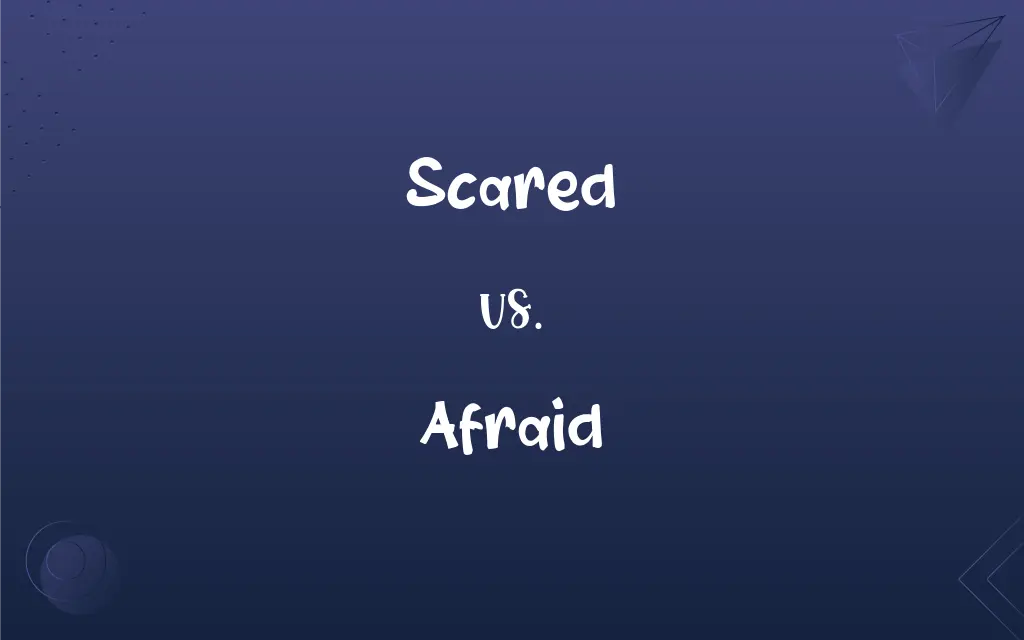Scared vs. Afraid: What's the Difference?
Edited by Janet White || By Harlon Moss || Published on December 14, 2023
Scared implies a sudden or intense feeling of fear, often caused by a specific event or situation, while afraid often denotes a more general or enduring sense of fear or apprehension.

Key Differences
The term scared often conveys a more immediate and intense reaction to fear, typically triggered by a specific event or situation. Afraid, in contrast, usually implies a broader, more sustained sense of fear, often encompassing anxiety or apprehension about something.
Scared is commonly used in contexts where the fear is sudden and perhaps overwhelming. Afraid, however, can describe a lingering sense of fear, perhaps not tied to a single moment but to a general condition or possibility.
When someone says they are scared, it often indicates a response to a present or very recent threat. Saying one is afraid, though, can refer to fear that is more anticipatory, concerned with future events or outcomes.
The usage of scared can be more colloquial or informal, suitable for describing momentary reactions. Afraid, on the other hand, can be used in more formal or serious contexts, often relating to deeper, longer-term fears.
Scared is often used in more dramatic or acute situations, where the emotional response is strong and immediate. In contrast, afraid might be employed in situations where the fear is less intense but more pervasive or enduring.
ADVERTISEMENT
Comparison Chart
Intensity of Feeling
Often denotes a sudden or intense fear.
Implies a more general, enduring sense of fear.
Context of Usage
Typically used for immediate, specific fears.
Used for broader, longer-term fears.
Nature of Fear
Reaction to a present or very recent threat.
Often anticipatory, concerned with future possibilities.
Formality
More colloquial and informal.
Suitable for formal or serious contexts.
Duration of Emotion
Implies a momentary, acute fear.
Suggests a sustained, pervasive fear.
ADVERTISEMENT
Scared and Afraid Definitions
Scared
Feeling frightened or alarmed by a specific event or situation.
I was scared when I heard strange noises outside my window.
Afraid
Being concerned or anxious about a possible or future event.
She was afraid that she might lose her job.
Scared
Experiencing a sudden or intense fear.
The loud thunder scared the young child.
Afraid
Indicating worry or concern about a potential outcome.
I'm afraid of what the future may hold.
Scared
Being in a state of panic or terror due to an immediate threat.
She was scared to see a snake in her garden.
Afraid
Feeling fear or apprehension about something, often less immediate.
I am afraid of failing the exam next week.
Scared
Showing a reaction of fear to a sudden or alarming incident.
The movie was so scary, I was scared throughout.
Afraid
Expressing a cautious attitude towards a risk or danger.
She was afraid to speak her mind in the meeting.
Scared
Feeling apprehensive about a particular, often tangible, danger.
He was scared to walk alone in the dark alley.
Afraid
Experiencing a general sense of dread or unease.
He is afraid of heights.
Scared
To strike with sudden fear; alarm.
Afraid
Filled with fear; frightened
Afraid of ghosts.
Afraid to die.
Afraid for his life.
Scared
To become frightened
A child who scares easily.
Scared
A condition or sensation of sudden fear
That mask gave me a real scare.
Scared
A general state of alarm; a panic
A bomb scare that necessitated evacuating the building.
Scared
Serving or intended to frighten people
Scare stories.
Scare tactics.
Scared
Feeling fear; afraid, frightened.
Scared
Simple past tense and past participle of scare
Scared
Made afraid;
The frightened child cowered in the corner
Too shocked and scared to move
FAQs
Can someone be both scared and afraid at the same time?
Yes, it's possible to experience both immediate fear (scared) and lingering apprehension (afraid) simultaneously.
Can scared and afraid be used interchangeably?
While they can be used interchangeably in some contexts, they often convey different intensities and durations of fear.
Is scared more about immediate reactions?
Yes, scared often describes immediate, intense emotional reactions to fear.
Is afraid more about internal feelings?
Yes, afraid often relates to internal feelings of fear or apprehension about potential scenarios.
What does being scared typically imply?
Being scared typically implies a sudden or intense reaction to fear, often caused by a specific event.
How is being afraid different from being scared?
Being afraid usually denotes a more general or enduring sense of fear or apprehension, often about future events.
Which is more formal, scared or afraid?
Afraid is generally more formal and is used in more serious contexts.
Does afraid imply a longer-lasting fear?
Yes, afraid often implies a more sustained, sometimes anticipatory, sense of fear.
Can you be scared for no reason?
Yes, it's possible to feel scared due to sudden panic or anxiety, even without a specific reason.
Is scared often used in a casual context?
Yes, scared is frequently used in casual or colloquial speech.
Does afraid imply a deeper level of fear?
Often, afraid implies a deeper or more sustained level of fear than scared.
Can scared be used to describe a thrilling experience?
Yes, scared can be used to describe reactions to thrilling or exciting experiences.
Does being scared always involve a visible reaction?
Often, being scared involves visible reactions like jumping or screaming, but it's not always necessary.
Can you use scared to describe a fear of abstract concepts?
Typically, scared is used for more tangible fears, while afraid can be used for abstract concepts.
Is the physical sensation of fear different when scared versus afraid?
The physical sensation can be similar, but being scared often results in more acute physical reactions.
Does afraid have a broader application than scared?
Yes, afraid can have a broader application, encompassing various types of fear and anxiety.
Can cultural factors influence the use of scared or afraid?
Yes, cultural factors and language nuances can influence how and when scared or afraid are used.
Can animals be scared or afraid?
Yes, animals can exhibit behaviors that suggest they are scared or afraid.
Does being afraid always relate to future events?
While often related to future events, being afraid can also concern present situations or general states.
Is being afraid more about mental state than physical reaction?
Yes, being afraid often pertains more to a mental state of worry or concern than to a physical reaction.
About Author
Written by
Harlon MossHarlon is a seasoned quality moderator and accomplished content writer for Difference Wiki. An alumnus of the prestigious University of California, he earned his degree in Computer Science. Leveraging his academic background, Harlon brings a meticulous and informed perspective to his work, ensuring content accuracy and excellence.
Edited by
Janet WhiteJanet White has been an esteemed writer and blogger for Difference Wiki. Holding a Master's degree in Science and Medical Journalism from the prestigious Boston University, she has consistently demonstrated her expertise and passion for her field. When she's not immersed in her work, Janet relishes her time exercising, delving into a good book, and cherishing moments with friends and family.







































































